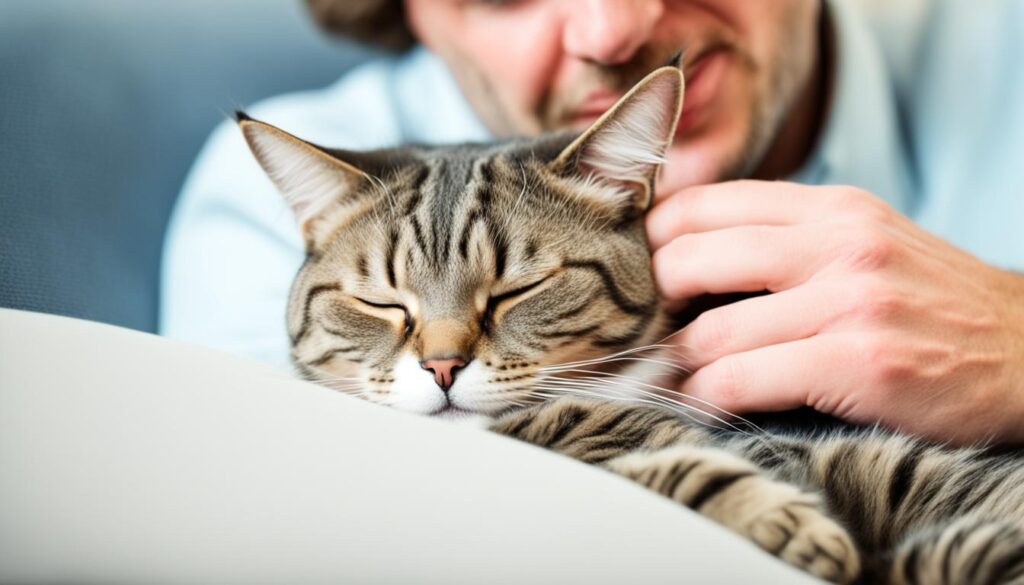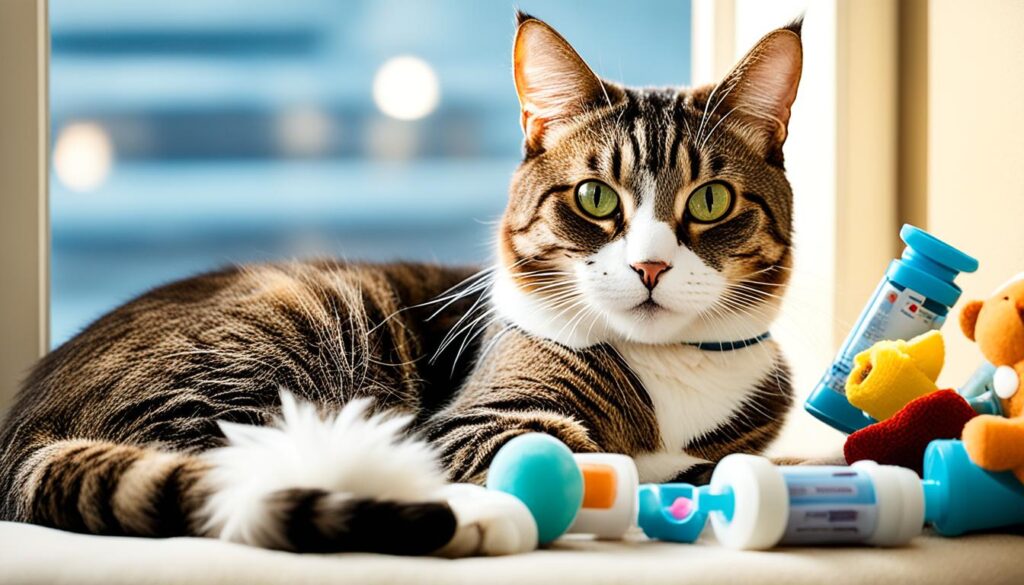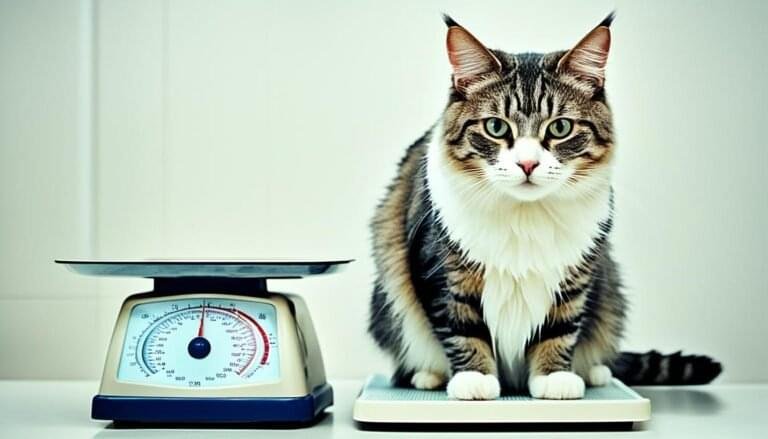Did you know that neutering has a significant impact on a male cat’s behavior? After undergoing this sterilization procedure, male cats experience a series of behavioral changes that can greatly improve their quality of life. From reduced aggression and roaming to improved litter box habits, neutering plays a crucial role in shaping a male cat’s behavior.
Neutering, which involves the removal of the testicles, not only prevents unwanted breeding but also brings about positive changes in a cat’s behavior. Let’s take a closer look at the key changes in male cat behavior after neutering and how they can benefit both the cat and its owner.
Key Takeaways:
- Neutering reduces aggression, roaming, and spraying behavior in male cats.
- Improved litter box habits are observed in neutered male cats.
- Neutering enhances bonding and increases affection toward family members and other cats.
- Behavioral changes may take up to a month to fully manifest after neutering.
- Proper post-operative care is crucial for a male cat’s recovery and overall well-being.
What is Neutering and its Benefits?
Neutering is a common procedure that removes a male cat’s testicles, preventing them from breeding. This simple yet effective sterilization method offers numerous advantages for both cats and their owners. Let’s explore the benefits of male cat neutering:
Population Control and Breeding Prevention
One of the primary reasons for neutering male cats is to prevent unplanned litters. By removing the testicles, neutering eliminates the risk of unwanted breeding and helps control the cat population.
Reduced Risk of Testicular Cancer
Neutering significantly reduces the chances of testicular cancer in male cats. Without the testicles, the risk of developing this type of cancer becomes virtually nonexistent.
Longer Lifespan
Neutered cats tend to have a longer lifespan compared to their intact counterparts. Research shows that neutering can reduce the risk of certain health issues and increase overall longevity in male cats.
Health Benefits
In addition to reducing the risk of testicular cancer, neutering also helps prevent other reproductive health problems in male cats. It minimizes the likelihood of diseases and conditions affecting the male reproductive system, promoting better overall health.
Behavioral Advantages
Neutering provides several behavioral benefits for male cats. It can help reduce aggression, territorial marking, roaming behavior, and spraying. Neutered cats are generally calmer, more affectionate, and exhibit improved litter box habits.
| Benefits of Neutering | Explanation |
|---|---|
| Population Control | Prevents unplanned breeding and helps control cat overpopulation. |
| Risk Reduction | Decreases the chances of testicular cancer and other reproductive health issues. |
| Longer Lifespan | Increases overall longevity in neutered male cats. |
| Improved Behavior | Reduces aggression, roaming, spraying, and promotes better litter box habits. |
Neutering is a safe and beneficial procedure that offers significant advantages for male cats. By neutering your cat, you not only contribute to population control but also provide them with a healthier and happier life. Consult with your veterinarian to determine the best time to neuter your male cat based on their age and overall health.
Reduced Aggression After Neutering
Aggression in male cats can be influenced by testosterone levels. Neutering, which removes the primary source of testosterone, can lead to a significant reduction in aggression. Studies have shown that both free-roaming and indoor neutered cats exhibit decreased aggression, including fighting and vocalization.
This change in behavior is beneficial for both the cat and its owner. A more peaceful living environment can be achieved, with less risk of injury or property damage caused by aggressive behavior. Neutered cats are generally more relaxed and less prone to engage in territorial disputes with other cats.
Avoiding aggression is crucial for maintaining a safe and harmonious atmosphere at home. Neutering provides a long-term solution to help manage and prevent aggressive behavior in male cats.
You can see the positive impact of neutering on aggression reduction in the following table:
| Behavior | Intact Male Cats | Neutered Male Cats |
|---|---|---|
| Fighting with other cats | Common | Rare |
| Vocalization during conflicts | Frequent | Less frequent |
| Territorial aggression | Pronounced | Reduced |
The data clearly shows that neutered male cats exhibit a significant decrease in aggressive behaviors compared to intact males. This reduction in aggression contributes to a more peaceful and harmonious environment, enabling a stronger bond between the cat and its owner.
In addition to aggression reduction, neutering offers a range of other benefits, such as decreased roaming behavior, reduced spraying, improved litter box habits, and increased affection towards family members. The positive effects of neutering on behavior make it a highly recommended procedure for male cats.
Decreased Roaming Behavior
Testosterone plays a significant role in a cat’s desire to roam and protect its territory. However, after neutering, male cats experience a notable decrease in their roaming behavior. Without the influence of testosterone, neutered cats are less likely to feel the urge to escape and explore the outdoors.
With their overall activity level reduced, neutered cats tend to be more content with indoor activities, finding fulfillment with toys, scratching posts, and engaging with their human companions. This shift in behavior helps create a safer and more controlled environment for them, as they are less exposed to the potential dangers outside the home.
| Behavior | Intact Male Cats | Neutered Male Cats |
|---|---|---|
| Roaming behavior | High desire to roam and explore territory | Less likely to try to escape and explore the outdoors |
| Activity level | High activity level and increased energy | Reduced overall activity and contentment with indoor activities |
| Outdoor dangers | Increased exposure to potential hazards | Decreased risk of accidents and dangers outside the home |
Reduced Spraying After Neutering
Intact male cats have a strong urge to mark their territory by spraying urine. Neutering significantly reduces or eliminates this spraying behavior. The removal of the testicles eliminates the hormonal drive behind urine marking. Neutered cats are more likely to use the litter box consistently, resulting in a cleaner and more pleasant living environment.
Urine marking is a natural behavior in male cats, especially those who are intact. It serves as a way to communicate their presence and establish territory boundaries. However, this behavior can be problematic for cat owners, as the scent of urine is not only unpleasant but can be difficult to eliminate from furniture, walls, and floors.
How Neutering Affects Spraying Behavior
When a male cat is neutered, the production of testosterone is significantly reduced. Testosterone is the hormone responsible for encouraging spraying behavior. By removing the testicles during the neutering procedure, the primary source of testosterone is eliminated, leading to a decrease in spraying behavior.
Neutering is most effective in reducing spraying behavior when performed at a young age, before the cat has established the habit of urine marking. However, even older cats can experience a reduction in spraying after neutering.
In addition to reducing spraying behavior, neutering also has other benefits for male cats. It decreases the risk of testicular cancer and helps prevent the development of certain urinary tract issues. Neutering also promotes better overall behavior and a more harmonious household, as it reduces the aggressive tendencies often associated with intact males.
Tips for Managing Spraying Behavior After Neutering
Although neutering significantly reduces spraying behavior in male cats, it is possible for some cats to continue spraying, especially if the behavior has become deeply ingrained. Here are some tips for managing spraying behavior after neutering:
- Thoroughly clean and disinfect any previously sprayed areas to remove the scent that may trigger the cat to spray again.
- Provide multiple litter boxes in different locations to encourage consistent litter box use.
- Use pheromone-based sprays or diffusers, such as Feliway, to create a calming environment and discourage spraying.
- Consult with a veterinarian or a professional animal behaviorist for further guidance and potential behavior modification techniques.
By following these tips and maintaining a consistent environment, spraying behavior can be effectively managed in male cats after neutering, leading to a cleaner and more enjoyable living space for both the cat and its owner.
| Behaviors | Intact Male Cats | Neutered Male Cats |
|---|---|---|
| Spraying Behavior | Highly likely to spray urine to mark territory. | Significantly reduced or eliminated spraying behavior. |
| Roaming | Tendency to roam and display territorial behavior. | Decreased desire to roam and protect territory. |
| Aggression | More prone to aggression, especially in intact males. | Reduced aggression and increased sociability. |
| Litter Box Habits | Inconsistent litter box use and potential urination outside the box. | Improved litter box habits and increased likelihood of consistently using the litter box. |
Improved Litter Box Habits
Neutering has a significant positive impact on a male cat’s litter box habits. Prior to neutering, intact males may exhibit territorial behavior by urinating on walls and furniture. However, after being neutered, cats become more inclined to follow their owner’s desire to use the litter box. This change in behavior promotes a happier relationship between the cat and its owner, resulting in fewer unwanted surprises around the house.
Neutering resolves the urge for intact males to mark their territory through urination, as the removal of the testicles eliminates the hormonal drive behind this behavior. Cats that have been neutered are more likely to consistently use the litter box, maintaining a cleaner and more pleasant living environment.
Advantages of Improved Litter Box Habits:
- No more urinating on walls and furniture
- Less need for extensive clean-up and odor control
- Avoidance of potential damage to household items
- Promotes a hygienic living environment for both the cat and its owner
Ensuring proper litter box training and providing a suitable litter box environment are essential for maintaining a cat’s improved litter box habits. Regularly scooping the litter, providing a quiet and accessible location, and using a litter box with appropriate dimensions are important factors to consider.
By addressing litter box behavior after neutering, owners can enhance the overall well-being of their neutered male cats and create a more harmonious living space for both feline and human family members.
| Benefits of Improved Litter Box Habits | How to Encourage Proper Litter Box Behavior |
|---|---|
| 1. Increased cleanliness and hygiene | 1. Choose a litter box with suitable dimensions |
| 2. Enhanced indoor living environment | 2. Provide a quiet and accessible litter box location |
| 3. Reduced odor and need for clean-up | 3. Regularly scoop the litter box |
| 4. Preservation of household items | 4. Use a litter type and depth preferred by the cat |
Increased Affection After Neutering

Neutering male cats not only has physical benefits but also plays a significant role in their behavior, particularly in terms of affection and bonding. Neutered cats tend to exhibit increased affection towards their families, creating a stronger human-cat bond. This change in behavior contributes to a more loving and harmonious relationship between the cat and its owner.
While intact cats may also display affection, neutered cats show a higher level of warmth and tenderness due to the absence of hormonal drives. The reduction of territorial instincts and aggression after neutering allows cats to become more relaxed and loving companions.
Furthermore, neutered male cats also tend to be less feisty with other cats they live with, facilitating a peaceful coexistence in multi-cat households. They are more inclined to form close bonds with their feline companions, promoting a sense of camaraderie and reducing the likelihood of conflicts.
To understand the importance of increased affection after neutering, it’s crucial to recognize the impact of hormones on male cat behavior. Testosterone, the primary hormone responsible for male cat aggression and territoriality, diminishes after neutering. As a result, neutered cats can redirect their energy towards affectionate behaviors, making them more responsive to their owners’ love and attention.
Neutering not only benefits the cat’s behavior but also enhances the overall well-being of both the cat and the owner. It fosters a loving and nurturing environment that strengthens the bond between the two. When it comes to male cat behavior, increased affection after neutering is a heartwarming transformation that brings joy and happiness to both the feline and human family members.
Timeline of Behavior Changes After Neutering
After neutering, male cat behavior undergoes a series of changes that occur over a specific timeline. The timing of these changes can vary from cat to cat, depending on various factors such as age and individual hormonal responses. Understanding the timeline of behavior changes can help cat owners know what to expect and how to support their cats during the adaptation process.
The hormonal effects of neutering begin immediately after the surgery. Testosterone, the primary male hormone responsible for many typical male behaviors, takes around a month or two to leave the system completely. During this period, some behaviors and odors associated with testosterone may persist as the hormone dissipates.
However, there are some noticeable results of hormone changes that can be observed sooner, within three days after the surgery. One of these changes is an increased appetite in neutered male cats. Hormonal adjustments can affect a cat’s metabolism and may lead to a larger appetite.
The adaptation process to the new hormonal balance after neutering can also vary in duration. Younger cats generally adapt more quickly to the changes, as their bodies are more flexible and responsive to hormonal shifts. On the other hand, older cats may take a longer time to exhibit behavior changes, as their hormonal systems may have been more established before neutering.
It’s important to note that behavior changes after neutering are not immediate or uniform for all cats. The timeline may differ from one cat to another, and individual factors can influence the pace of adaptation. Patience and consistent care are key in supporting cats during this transition period.
| Timeline of Behavior Changes After Neutering | Typical Changes |
|---|---|
| Within 3 days | Increased appetite |
| 1-2 months | Complete dissipation of testosterone |
| Varies | Adaptation to new hormonal balance |
Post-Neutering Care for Male Cats

Proper post-operative care is crucial for a male cat’s recovery after neutering. Following these post-surgery instructions helps ensure a smooth healing process and minimizes the risk of complications. Here are some important guidelines to consider:
Minimize Activity and Provide a Confined Space
After neutering, it’s essential to restrict your cat’s physical activity to allow for proper rest and healing. Keep your furry friend in a quiet and confined space, such as a separate room or a large crate, free from any hazards that could cause injury. Providing a confined space helps prevent excessive movement and reduces the chances of reopening the incision site.
Use an E-Collar
To prevent your cat from licking or biting the incision area, your veterinarian may recommend using an Elizabethan collar, colloquially known as an “e-collar.” This cone-shaped collar prevents the cat from accessing the surgical site and interfering with the healing process.
Monitor for Discomfort, Swelling, and Infection
Regularly observe your cat for any signs of discomfort, swelling, redness, or discharge around the incision site. These may indicate an infection or other complications. Additionally, if your cat seems excessively lethargic, experiences a loss of appetite, or displays major behavior changes, consult your veterinarian promptly.
Proper Wound Care
Depending on your veterinarian’s instructions, you may need to clean the incision site following specific guidelines. This could involve gently wiping the area with a mild antiseptic solution or using sterile saline solution. It’s crucial to follow the recommended wound care routine to promote healing and reduce the risk of infection.
Prevent Access to Stairs and Jumping
During the recovery period, it’s important to prevent your cat from jumping onto high surfaces or using stairs. These activities could strain the healing incision and delay the recovery process. Consider setting up temporary barriers or providing ramps to help your cat navigate the environment without causing further harm.
Follow Up with the Veterinarian
Regular follow-up appointments with your veterinarian are crucial to monitor the progress of your cat’s recovery. These appointments allow the vet to assess the healing process, address any concerns, and potentially remove stitches. If you notice any unusual or concerning symptoms, don’t hesitate to schedule additional visits or reach out to your veterinarian for guidance.
| Post-Neutering Care Checklist |
|---|
| Minimize physical activity and provide a confined space for resting |
| Use an e-collar to prevent licking or biting of the incision site |
| Monitor for discomfort, swelling, redness, or discharge |
| Follow proper wound care instructions |
| Prevent access to stairs and jumping |
| Schedule and attend follow-up appointments with the veterinarian |
By providing appropriate post-operative care, you can support your cat’s recovery after neutering and promote a faster, complication-free healing process. Remember, always consult with your veterinarian for specific instructions tailored to your cat’s needs.
Common Complications of Neutering
While neutering is generally a safe procedure for male cats, it’s important to be aware of potential complications that can occur. Although these complications are rare, knowing the risks can help you take proactive measures to ensure your cat’s well-being.
Bleeding or Swelling at the Surgery Site
One possible complication of neutering is bleeding or swelling at the incision site. This can occur due to the surgical procedure, but it usually resolves on its own within a few days. If you notice excessive bleeding or swelling, it’s important to contact your veterinarian for further guidance.
Weight Gain After Neutering
Weight gain is a common complication associated with neutering. The hormonal changes that occur after the procedure can lead to an increased appetite in some cats, resulting in weight gain over time. It’s important to monitor your cat’s weight and body condition regularly and adjust their feeding and exercise routines as needed to prevent obesity and related health issues.
Preventing Post-Operative Complications
To minimize the risk of complications after neutering, it’s crucial to follow your veterinarian’s post-operative care instructions. This may include keeping your cat calm and confined, preventing excessive licking of the incision site, and monitoring for any signs of infection or discomfort. Regular check-ups with your veterinarian can also help identify and address any potential issues before they become major problems.
Visual Representation: Common Complications of Neutering
| Complication | Description |
|---|---|
| Bleeding or Swelling at the Surgery Site | Possible occurrence of bleeding or swelling at the incision site, usually resolves on its own |
| Weight Gain After Neutering | Hormonal changes can lead to increased appetite and weight gain |
| Preventing Post-Operative Complications | Follow veterinarian’s instructions for post-operative care to minimize complications |
To give you a visual representation of the common complications of neutering, refer to the table below:
Importance and Timing of Neutering
Neutering is a crucial procedure for male cats, offering various benefits such as preventing overpopulation and reducing the risk of certain health issues. It is generally recommended to neuter cats before they reach sexual maturity to maximize the positive effects.
Neutering kittens as young as seven weeks old is safe, although most veterinarians prefer to wait until after their vaccines are complete, typically around four months of age, for optimal results. Neutering at an early age not only ensures the prevention of unwanted behaviors but also promotes a healthier and happier life for male cats.
| Advantages of Early Neutering |
|---|
| 1. Prevents overpopulation by eliminating the ability to reproduce. |
| 2. Reduces the risk of testicular cancer and certain other health problems. |
| 3. Minimizes aggressive behaviors, such as fighting, biting, and territorial marking. |
| 4. Decreases the desire to roam, preventing potential accidents and injuries. |
| 5. Improves litter box habits, promoting cleanliness and reducing unwanted odors. |
| 6. Enhances the bond between male cats and their human companions. |
Neutering male cats at an optimal age is a responsible decision that ensures their well-being and contributes to controlling the cat population. By understanding the importance of neutering and timing it appropriately, cat owners can provide their feline friends with a healthier and happier life.
Conclusion
Neutering male cats brings about several positive changes in behavior, promoting a healthier and happier cat. Behavioral changes include reduced aggression, roaming, spraying, and improved litter box habits. By understanding these changes and providing proper post-neuter care, cat owners can create a more harmonious environment for their feline companions.
Neutering is an important procedure that benefits both the cat and the owner. It not only prevents overpopulation but also reduces the risk of certain health problems, such as testicular cancer. Timing is crucial, and discussing the procedure with a veterinarian will help determine the best age for neutering.
Post-neuter care is essential for a smooth recovery. Minimizing activity, confining the cat to a safe space, and monitoring for any signs of discomfort or infection are important steps. Proper care contributes to a faster healing process and ensures a successful outcome for the cat.
By considering the benefits of neutering, understanding the behavior changes that occur, providing post-neuter care, and timing the procedure appropriately, cat owners can promote a healthier and happier life for their beloved pets. Neutering is an essential step in responsible cat ownership and contributes to the overall well-being of the cat and the household.
FAQ
What are the key changes in male cat behavior after neutering?
What is neutering, and what are its benefits for male cats?
Does neutering reduce aggression in male cats?
Does neutering decrease roaming behavior in male cats?
Does neutering reduce spraying behavior in male cats?
Does neutering improve litter box habits in male cats?
Does neutering increase affection in male cats?
What is the timeline of behavior changes after neutering?
What care is needed for male cats after neutering?
What are the common complications of neutering?
Why is neutering important, and when is the optimal timing for neutering male cats?
References
|
International Cat Association (TICA) |
|
|
The Cat Fanciers’ Association (CFA) |
|
|
World Cat Federation (WCF) |
|
|
Fédération Internationale Féline (FIFe) |








[…] pattern is the shaded pattern, which is characterized by a gradual change in color from the cat’s back to their belly. This shading can be any color, with the most common being silver or […]
[…] Changing your cat’s behavior takes time and patience. Be consistent in applying training techniques and avoid unintentionally reinforcing their biting behavior. With persistence and consistency, your cat will learn new habits and begin to reduce foot biting. […]
[…] socialization is key to helping Great Danes develop good behavior and interact well with other dogs and humans. Exposing them to various stimuli, including different […]
[…] they were younger. They might get territorial, using scent or visuals to claim their space. Also, male cats might spray to attract […]
[…] like persistent itching, bald patches, skin lesions, or changes in grooming behavior warrant a vet visit for proper diagnosis and […]
[…] important to recognize in order to provide appropriate care. By being observant and attentive to changes in your cat’s behavior and physical condition, you can effectively identify potential fever symptoms. Here are some key […]
[…] appropriately and diffuse potential conflicts. By being attentive and proactive in interpreting a cat’s behavior, owners can intervene early and prevent aggressive incidents from occurring. It is important to […]